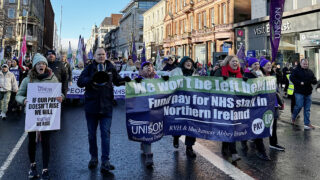At a meeting of the Northern Ireland Ambulance Service branch of UNISON on 6 August 2014 a vote of “No confidence” was taken in the NIAS Trust Board, Chief Executive Officer and Directorship.
UNISON currently represents approximately 750 ambulance staff across Northern Ireland. UNISON Shop Stewards and staff representatives from across the province voted unanimously that they no longer had confidence in the NIAS Trust Board, CEO and Directorship to effectively manage the day to day running of the Ambulance Service in Northern Ireland.
Morale amongst the Operational and Control Staff is at an all time low with members stating that they feel so overstretched and physically and emotionally drained, that they don’t know how long they can continue in this vein.
The reasons given by staff are:
Recent media interviews by the Director of Operations
Staff have expressed disappointment, anger and frustration at the recent comments made in the media by the Director.
Staff believe that this was a platform for the Director to inform the people of Northern Ireland of the difficulties faced by the Ambulance Service, but instead they felt that he laid the blame for the drop in ambulance cover upon those staff members who were ill.
Staff felt that he implied that they were simply phoning in sick because they couldn’t get leave during the good weather.
UNISON is confident that the Northern Ireland public holds their ambulance staff in the highest regard. Not just for the work they do presently, but for the sacrifice, loyalty and dedication they demonstrated throughout “the Troubles”. The public will recognize these comments for what they were, an attempt to blame the shortcomings of management on the staff.
Lack of resources to meet demand
A yearly increase of approximately 5% per year in demand has not been matched by an increase in ambulances to meet this demand. The number of ambulances has actually been decreased in order to meet efficiency savings.
This has resulted in the existing staff having to work harder, attending more 999 calls and having less or no “down time” between 999 calls. This leads to increased levels of stress and fatigue amongst staff.
Insufficient rest periods / meal breaks
Ambulance crews remain “on call” for all “Category A” emergency calls during their meal breaks. The increase in demand coupled with the decrease in ambulances has led to many crews either not receiving a meal break at all or being interrupted during their meal break. This has led to staff feeling ill and reporting sick, thus further reducing the number of available ambulances and increasing the workload and stress on existing staff.
Lengthy Handover / Turnaround times at hospital
Ambulance crews frequently have to care for patients whilst standing in queues at hospital A&E Departments. They can often be left in corridors for hours looking after these patients, often long after their shift has finished, or during their shift, when they are due or overdue for a meal break.
Enforced overtime / Late Finishes
All A&E ambulance staff are aware of the requirement to answer 999 calls up until the end of their period of duty. However, due to the reduction in number of available ambulances and increased demand, staff now regularly receive 999 calls in the last few minutes of their shift, leading to them being hours late off duty. This not only impacts on the staff but also their families and friends who await their return from work.
Refusal / cancellation of Annual Leave
Ambulance staff receive four weeks rostered Annual Leave per year. The remainder of their leave entitlement is referred to as Casual Leave. Rostered Leave is guaranteed, but Casual Leave is not. Casual Leave is used by staff for occasions such as family weddings, Christenings, funerals or to attend social functions. There are many examples of the Trust’s inability to manage and accommodate Casual Leave requests. This results in staff not having their leave granted or cancelled at short notice. This also impacts on their families and social life, causing unnecessary difficulties in relationships outside the working environment.
Agenda for Change Job Evaluation
The majority of A&E Ambulance staff have still not been banded under the NHS pay scheme. This should have happened in 2004, but due to the intransigence of NIAS management, the majority of A&E staff are still awaiting an agreed outcome. Staff view this delay as an example of management’s intention to undermine staff and pay them as little as possible.
Fear of Disciplinary Action
Ambulance staff work under the constant fear and threat of disciplinary action being taken against them by the Northern Ireland Ambulance Service. Many are too frightened to speak out for fear of reprisal, and go about their daily work dreading the day when they may make a mistake or receive a complaint against them. The likelihood of such errors or mistakes is heightened when crews are not getting time to eat or rest between calls and being forced to work past their finishing time.
All of these issues have been on the negotiating table for many years and UNISON’s teams have worked tirelessly to bring about resolution without success. The management stance is such that no light can be seen at the end of the tunnel and as such UNISON members have no confidence in being able to resolve these issues in the current climate.
UNISON believes that it is now time for an external investigation/enquiry into how the Northern Ireland Ambulance Service is being managed. UNISON would be keen to engage with any such enquiry.
For further information contact the joint branch secretaries Mark Quigley on 07843 231 703 or Alistair Long on 07738 267 646 or branch chair Richard Dundas on 07753 722 052.





